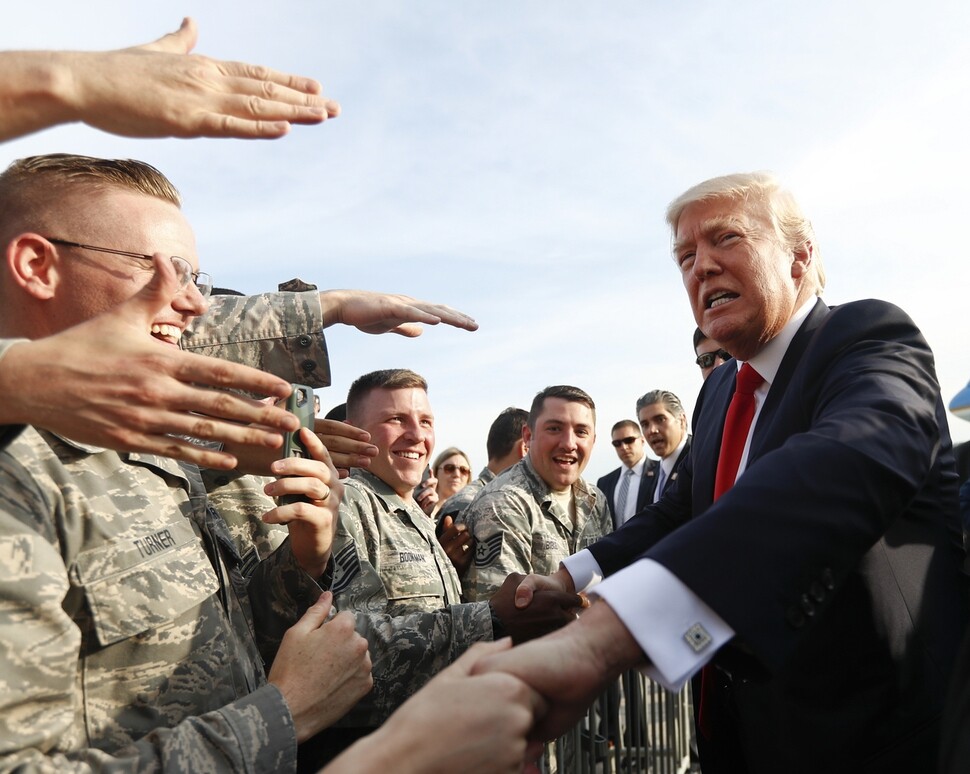hankyoreh
Links to other country sites 다른 나라 사이트 링크
McMaster’s doublespeak on THAAD costs feeding fire started by Trump

US President Donald Trump kept up the pressure on South Korea to pay THAAD deployment costs for a second straight day.
The growing outcry prompted senior South Korean and US officials to put out the fire by reaffirming their existing agreement on the issue. But Trump’s characteristic unpredictability has many worried he could send another THAAD invoice - or that something similar could happen on the issue of US Forces Korea stationing costs.
“Why should we pay for [THAAD]?” Trump asked in a Washington Times interview given on the eve of his 100th day in office on Apr. 28.
“I respectfully say that I think it would be appropriate if [South Korea] paid for it,” he added.
Trump went on to describe THAAD as a “phenomenal protective system” that is “meant to protect South Korea.”
Trump has repeatedly stressed THAAD as a “billion-dollar system” since first stating in a Reuters interview the day before that he would be asking South Korea to pay for its deployment. He also restated his intent to renegotiate the South Korea-US Free Trade Agreement for a second straight day, describing it as having been “a very bad deal for the United States, negotiated by [then-Secretary of State] Hillary Clinton.”
The heavy backlash to Trump‘s remarks in South Korea and at home prompted a 35-minute emergency phone conference on the morning of Apr. 30 by Blue House Office of National Security chief Kim Kwan-jin and White House National Security Advisor H. R. McMaster.
During the conversation, Kim and McMaster “reconfirmed what has been already agreed between the ROK and the U.S. regarding cost-bearing for the THAAD deployment by the USFK,” the Blue House said. The Blue House also quoted McMaster as having explained in the call that Trump’s recent remarks were “made in a general context in line with the U.S. public expectations on burden-sharing with allies.”
If the Blue House account of the conversation is accurate, it would amount to an unprecedented repudiation of Trump’s remarks by senior South Korean and US officials. The South Korean Ministry of National Defense has explained that the agreement signed in July of last year assigns Seoul responsibility for the THAAD site and infrastructure while the US covers its deployment and maintenance.
But in an Apr. 30 interview with Fox News, McMaster said when asked about THAAD, “The question of what is the relationship on THAAD, on our defense relationship going forward, will be renegotiated as it’s going to be with all of our allies.”
While senior South Korean and US officials may have put out the fire for now, the embers don’t look likely to die down completely until Trump himself offers an explanation. So far, Trump has shown an intense level of concentration on the issues he is most interested in. In that sense, his two requests to date for payment on the THAAD deployment may not be the last. The precise story and details of his report of having “informed” Seoul of his demand for payment of THAAD costs also remain unknown.
By Yi Yong-in, Washington correspondent and Choi Hye-jung, staff reporter
Please direct questions or comments to [english@hani.co.kr]

Editorial・opinion
![[Column] The state is back — but is it in business? [Column] The state is back — but is it in business?](https://flexible.img.hani.co.kr/flexible/normal/500/300/imgdb/original/2024/0506/8217149564092725.jpg) [Column] The state is back — but is it in business?
[Column] The state is back — but is it in business?![[Column] Life on our Trisolaris [Column] Life on our Trisolaris](https://flexible.img.hani.co.kr/flexible/normal/500/300/imgdb/original/2024/0505/4817148682278544.jpg) [Column] Life on our Trisolaris
[Column] Life on our Trisolaris- [Editorial] Penalties for airing allegations against Korea’s first lady endanger free press
- [Editorial] Yoon must halt procurement of SM-3 interceptor missiles
- [Guest essay] Maybe Korea’s rapid population decline is an opportunity, not a crisis
- [Column] Can Yoon steer diplomacy with Russia, China back on track?
- [Column] Season 2 of special prosecutor probe may be coming to Korea soon
- [Column] Park Geun-hye déjà vu in Yoon Suk-yeol
- [Editorial] New weight of N. Korea’s nuclear threats makes dialogue all the more urgent
- [Guest essay] The real reason Korea’s new right wants to dub Rhee a founding father
Most viewed articles
- 1[Column] Why Korea’s hard right is fated to lose
- 2Amid US-China clash, Korea must remember its failures in the 19th century, advises scholar
- 360% of young Koreans see no need to have kids after marriage
- 4[Column] The state is back — but is it in business?
- 5Presidential office warns of veto in response to opposition passing special counsel probe act
- 6[Editorial] Stagnant youth employment poses serious issues for Korea’s future
- 7Inside the law for a special counsel probe over a Korean Marine’s death
- 8[Column] Can Yoon steer diplomacy with Russia, China back on track?
- 9[Guest essay] Maybe Korea’s rapid population decline is an opportunity, not a crisis
- 10[Editorial] Penalties for airing allegations against Korea’s first lady endanger free press